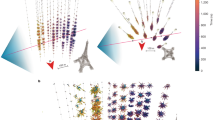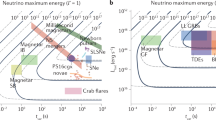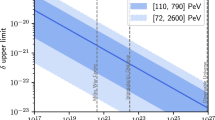Abstract
THE solar neutrino discrepancy is now regarded1,2 as very serious. The general attitude is that the Sun is trying to tell us something but no one is quite sure what. I wish in this note to add to the list of possible ad hoc explanations; namely that the scarcity of 8B neutrinos reflects a departure of the distribution of relative kinetic energies from the Maxwellian distribution. I have not been able to calculate a cause of the indicated depletion of the high energy tail of relative energies, so this explanation must be limited to the associated effect.
This is a preview of subscription content, access via your institution
Access options
Subscribe to this journal
Receive 51 print issues and online access
$199.00 per year
only $3.90 per issue
Buy this article
- Purchase on SpringerLink
- Instant access to the full article PDF.
USD 39.95
Prices may be subject to local taxes which are calculated during checkout
Similar content being viewed by others
References
Davis, R., jun., and Evans, J. C., Proc. XIII int. Conf. Cosmic Rays, (Denver 1973).
Bahcall, J. N., Astr. J., 76, 283 (1971).
Clayton, D. D., Principles of Stellar Evolution and Nucleosynthesis chapter 4. (McGraw Hill, New York, 1968).
Bahcall, J. N., Bahcall, N. A., and Ulrich, R. K., Astrophys. J., 156, 559 (1969).
Author information
Authors and Affiliations
Rights and permissions
About this article
Cite this article
CLAYTON, D. Maxwellian relative energies and solar neutrinos. Nature 249, 131 (1974). https://doi.org/10.1038/249131a0
Received:
Issue date:
DOI: https://doi.org/10.1038/249131a0
This article is cited by
-
The Minimal Length Uncertainty and the Nonextensive Thermodynamics
International Journal of Theoretical Physics (2016)
-
Rate of radiated power loss with different statistical distributions
Zeitschrift f�r Physik D Atoms, Molecules and Clusters (1994)
-
Radiative recombination rates with different statistical distributions
Zeitschrift f�r Physik D: Atoms, Molecules and Clusters (1993)
-
Neutron reaction rates revised
Nature (1988)
-
Closed-form evaluation and approximation considerations of the non-resonant thermonuclear reaction rate
Astrophysics and Space Science (1981)



